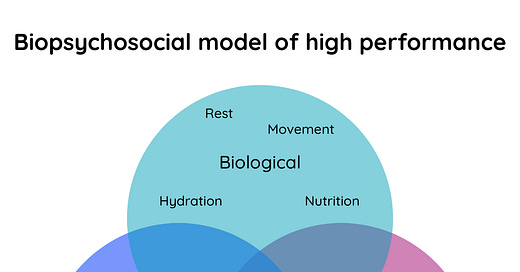#4: Taking a holistic approach to high performance
What the biopsychosocial model teaches us about the importance of rest
I’ve finished writing up my End of Module Assessment for DE300 - aka, the final year project. I’ve even submitted it three whole days before the deadline — hurrah for the overachiever! It was a no-miss (i.e. absolutely under no circumstances were extensions permitted), so I thoroughly planned this out to have plenty of buffer — just in case! But I’m pleased to say that wasn’t necessary, and I’m feeling pretty happy with myself right now.
I do, however, have one more piece of assessed work to complete, and it’s no less important. My other module, DD317, also has an End of Module assessment. This one is a 3000 word essay on ‘there is no such thing as an individual’, and I also have to write a section linking it to a contemporary issue or news item. It requires deep thought and attention, but I’m feeling brain-fatigued from the mammoth effort I’ve put in over the past few weeks already.
This is the point where I have decided to take a week ‘off’ from studying, and come back to it next week — even though my degree isn’t done, even though I have another looming deadline coming up fast.
I’ve made this decision because I’m recognising the importance of rest — not just intellectualising the need, but truly appreciating its importance through my embodied experience of it, with a side helping of therapy to support me to reframe unhelpful beliefs. I was brought up to believe my intrinsic value is in what I can do for others. Somewhere deep down I believe that I exist solely to serve and therefore put everyone else’s needs ahead of my own. I think this is quite common for girls and women, who are often fed these messages from society via our parents. It’s taking quite a lot to unpick these beliefs, but I am seeing progress.
Now seems a good time to introduce you to the biopsychosocial model of high performance. In it, I’ve listed out the ‘inputs’ needed to ensure a human being is performing at their best. These are the things that you can control — to some extent at least.
I find it helpful to visualise it as a Venn diagram, because you can see how each aspect intersects with the other. For example, if I don’t eat properly (nutrition + habits) I get really irritable (emotions) and then I get snappy with my partner (relationships) and find it really hard to study (skills).
So it’s about having each of these aspects in balance with the other — a sort of homeostasis. Spending too long or too little in one sector, or on one aspect of it (like studying too much!) can throw the whole system out, and then I have to work even harder to get back to an even kilter. It’s exhausting.
So back to rest.
Earlier this year I read a couple of books on this subject: ‘The Art of Rest: How to Find Respite in the Modern Age’ by Claudia Hammond, and ‘The Expert Guide to SleepingWell: Everything you Need to Know to get a Good Night’s Sleep’ by Chris Idzikowski.
What I took from these is that:
Sleep hygiene is really important — and I needed to overhaul my night-time routine to create an environment conducive to sleep (no more doom scrolling just before lights out!)
There are different types of rest, and we need a good mix of each in order to feel replenished.
Reading is the nation’s favourite way of resting.
Perhaps these aren’t Earth-shattering revelations to you; there is an element of common sense here, more so if you have any interest in good health or longevity. And yet, it’s so easy to ‘forget’, or justify not doing them when you are so busy (and isn’t that rather the point you need them most?)
I have also often shared with clients and on social media the metaphor of elite level athletes using rest strategically — it’s built into their training plans. If only I could take this advice for myself sometimes!
Well, rest is being prioritised this week.
Today (being Monday, and also a public holiday in the UK) I got up early as usual to hit the gym first thing. Routines can also be seen as a form of ‘rest’, because you’re not having to expend huge amounts of brain energy to make decisions on what you’re doing with your time. Wendy Wood in ‘Good Habits, Bad Habits’ calls this automaticity — actions you take without thinking consciously about them. I followed up my workout with a lovely walk with my boys at a local lake. According to Hammond, being in nature is number 2 and walking is number 6 in the rankings of most restful activities. And it was glorious sunshine (if a little windy!). In the car on the way home I indulged in a little of number 8 — daydreaming out the window. The Cambridgeshire landscape with its scattered wind turbines does lend itself to drifting away, in a manner Miguel de Cervantes would be proud of.
I have client work on Wednesday and Friday, meaning I have two days when I am free to choose what I want to do. My natural inclination is to plan, so I’m resisting! At most, I would like to make my way through more of Tim Peake’s autobiography, ‘Limitless’ (it’s a signed copy I picked up when he came to the Cambridge Corn Exchange on his speaking tour last year).
However, I will see where the day takes me…






